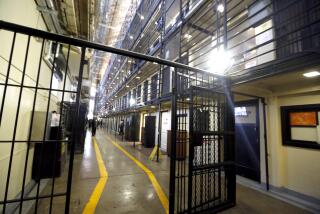Medium Security Captives Moving to New Guantanamo Site
- Share via
WASHINGTON — The U.S. military will soon open a medium security detention center in Cuba for prisoners from the war on terrorism that will allow them much more freedom, a move that could lead to the eventual repatriation of many of the 650 captives held at the U.S. naval base at Guantanamo Bay, officials said Thursday.
The decision to build “Camp IV” comes at a time when 19 of the detainees have attempted suicide in recent weeks, mostly by trying to hang or choke themselves in their cells, and legal challenges are pressuring the Bush administration to either release the captives or at least allow them access to attorneys.
Most of the detainees were captured during the war in Afghanistan.
Army Lt. Col. Bill Costello, a spokesman for the military joint task force at Southern Command in Miami, which is overseeing the detention operation in Cuba, said the new center will open in about two weeks and will house medium security prisoners who have already undergone interrogation and interviews by U.S. intelligence officials.
The new camp will be inside the perimeter of Camp Delta, but it will have a vastly more relaxed atmosphere than the single cells that detainees now occupy.
Instead, Camp IV will be a general population facility with large day rooms allowing detainees to play sports, games and assemble. Construction of the facility is expected to be completed by early March, and about 200 of the detainees -- or nearly a third of the current prison population confined under maximum security conditions -- will be moved there, Costello said.
“It would permit some of the detainees to have a little bit more freedom to congregate with each other, to pray together, to recreate together,” he said.
“It’s for those who are considered less of a security risk and have been cooperative in the interrogation process, and to prepare detainees who may be identified for being returned to their home countries.”
He said the plan calls for inmates in Camp IV who continue to behave and who evince no security risks to eventually “be on their way to repatriation.”
The first detainees began arriving in Cuba a little more than a year ago, and many of them and their families, along with civil rights groups in this country and abroad, have urged the administration to free those who are not terrorists or true prisoners of war, or to at least give them access to defense lawyers.
Last year, the first group of detainees was released, including four men from Afghanistan and one from Pakistan. But then earlier this month, another group of about 25 detainees was brought to Camp Delta.
Nevertheless, some advocates believe the opening of Camp IV signals that more releases may be imminent.
Tom Wilner, a District of Columbia attorney, is representing 12 Kuwaitis being held in Cuba and has asked an appellate court in Washington to allow them to at least meet with lawyers to fashion some kind of legal case for their defense.
“U.S. officials have privately acknowledged for months now that many people at Guantanamo, and the 12 Kuwaitis there, are innocent,” he said Thursday. “We hope this is a step toward releasing them.
“There is simply no legal or moral excuse for jailing innocent people any longer.”
Costello would not say which detainees would be selected for Camp IV. But he said the center will have four large complexes, each with a large communal living room, along with showers, sinks and toilet facilities.
The detainees will be given special privileges, such as two large recreation areas, game rooms, writing materials and books.
But he said the new facility would not be used for detainees who have attempted suicide or have tried to harm guards or fellow inmates.
“If they are trying to commit suicide, or were picked out because they were deemed dangerous to others, we’re certainly not going to house them in an area where they would commingle with other people,” Costello said.
Because all the detainees are now housed in individual maximum security cells in Camp Delta, guards are constantly monitoring their activities and quickly responding to problems, he said.
Most of the suicide attempts were by detainees who used clothing items such as a pant leg in attempts to strangle themselves. Guards have been able to stop them each time.
“It’s not like 19 folks have been cut down from an overhead support structure,” Costello said. “Once a guard finds a detainee attempting something like that, the guard goes in and prevents it.”
Authorities acknowledge that a year in captivity, without visits from lawyers or family members, has been trying for many of the detainees. “There are mental health experts down there dealing with counseling,” he said.
More to Read
Sign up for Essential California
The most important California stories and recommendations in your inbox every morning.
You may occasionally receive promotional content from the Los Angeles Times.











